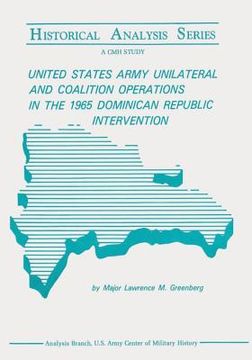United States Army Unilateral and Coalition Operations in the 1965 Dominican Republic Intervention
Synopsis "United States Army Unilateral and Coalition Operations in the 1965 Dominican Republic Intervention"
This publication, the fifth in the Historical Analysis Series, addresses the role of the United States Army in the Dominican Republic intervention of 1965. Conducted by the 82d Airborne Division, the operation encompassed unilateral combat and peace-keeping duties as well as participation in a regional, multinational peace-keeping military force. The only coalition military force ever fielded by the Organization of American States, the Inter-American Peace Force signified a peak in regional cooperation in the Americas. For operation planners, Army leaders, and students of military or diplomatic history, this study provides an opportunity to examine the role of large-scale military intervention as an integral part of American foreign policy execution. President Lyndon B. Johnson used American military force to support the diplomatic settlement of the Dominican Civil War and the violence and threat of Communist expansion it possessed. As commander of American ground forces, Lt. Gen. Bruce Palmer, Jr., implemented procedures which stressed often changing definitions of American neutrality, restraint by the individual soldier, and cooperation and coordination with the U.S. Department of State, the Organization of American States, and the six-nation Latin American contingent to the Inter-American Peace Force . General Palmer's ability to deal with political organizations and his determination to support American diplomatic initiatives with the application of firm, but rest rained, military force is a model for future coalition operations. A pertinent section of this paper examines the perceptions, apprehensions, and debates within the Organization of American States that surrounded the formation of the Inter-American Peace Force. The organization's members faced a major dilemma -- did the violence and possible threat of Communist expansion in the Caribbean justify their perceived threat of an American return to unilateral military interventionism? The manner in which they dealt with this problem not only formed the basis for establishing the Inter-American Peace Force but greatly influenced both President Johnson's decision to intervene and the subsequent conduct of the entire operation.

